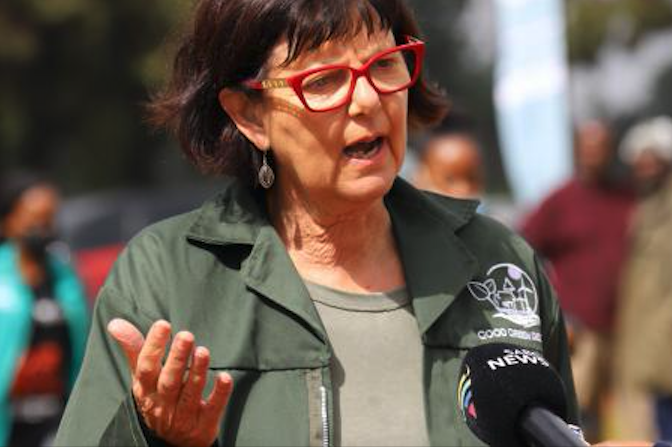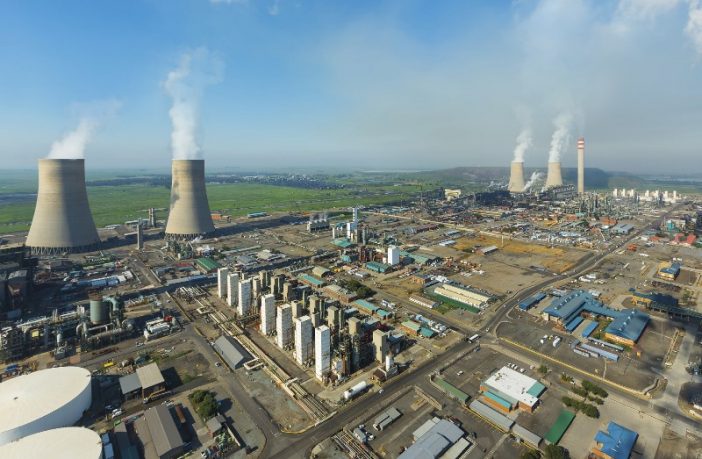- Just Share has submitted a responding statement to Sasol’s appeal against the decision handed down by the National Air Quality Officer (NAQO) on 11 July 2023.
- In that decision, the NAQO refused Sasol’s application for an “alternative emission limit” for the emission of toxic sulphur dioxide (SO2) from the 17 coal boilers at its Secunda operations.
- The Minister of Forestry, Fisheries and the Environment (“the Minister”) is the decision-maker on the appeal.
The Minimum Emission Standards (MES) regulate harmful atmospheric emissions from certain listed activities (including coal boilers) based on their concentration (the mass of pollutant per cubic metre of air emitted). In an attempt to avoid complying with the MES from 1 April 2025, Sasol applied to the NAQO to have SO2 emissions from its coal boilers regulated based not on their concentration, as required by the MES, but on their load, “from 1 April 2025 onwards”. It claimed that this load-based approach would achieve double the reductions in SO2 emissions compared to the MES’s concentration-based regulation. In fact, the opposite is true: this would permit Sasol to emit more than double the SO2 authorised by the MES.
In addition to arguing that Sasol’s claims about load-based emissions are incorrect, Just Share argues that the law is clear that no facility can operate in non-compliance with the MES beyond 31 March 2025. Sasol’s attempts to persuade the Minister that it should be regulated according to a system that Sasol prefers, rather than the one set out in law, should be rejected.

South Africa’s Minister of Forestry, Fisheries and Environment, Barbara Creecy. Image credit: DFFE
A decade of delays
This brief background document summarises Sasol’s many prior attempts to avoid compliance with the SO2 MES. Despite having had an inordinately long time to prepare for and ensure MES compliance,Sasol now seeks further leniency from the Minister. Concerningly, at its recent results presentation, Sasol said that it would “follow due processes to try to resolve the issue, to try and find an amicable solution to both parties” if the Minister does not uphold its appeal. In other words, Sasol will lobby the Minister to ensure preferential treatment and essentially an exemption from complying with the law that it has been aware of for over a decade.
The List of activities which result in atmospheric emissions which have or may have a significant detrimental effect on the environment, including health, social conditions, economic conditions, ecological conditions or cultural heritage, 2013 (“the List of Activities”), was first published in 2010. It set out the MES, and provided ten years’ notice for facilities to comply with 2020/new plant MES. In addition, it afforded facilities an opportunity to apply to extend that by a further 5 years. Sasol was granted this extra indulgence.
In addition to having 15 years’ lead time to meet the 2020 MES, in 2020 the SO2 MES were changed by the then Minister without any public consultation and made doubly as lenient. South Africa’s SO2 MES are now approximately 10 times weaker than the equivalent standards in India and about 28 times weaker than the standards in China, notwithstanding the significant health impacts of SO2, which Sasol does not appear to dispute. Despite this, Sasol still does not intend to comply with the 2020 SO2 MES by April 2025, and instead applied to the NAQO for its coal boilers to be regulated based on a load-based limit, which would allow it to continue this non-compliance indefinitely.
The NAQO’s decision
On 11 July, the NAQO, Dr Patience Gwaze, rejected Sasol’s application. She pointed out, inter alia, that the List of Activities only permits one postponement of compliance with the 2020 MES, and that Sasol had already been granted that indulgence. Her decision states that, “to consider any deviation from the MES, including by an alternative emission limit, after the March 2025 compliance deadline, would be contrary to the purpose of the [List of Activities] and the empowering legislation”.
Dr Gwaze’s decision also notes that Sasol’s application had failed to meet other prescribed requirements.
Sasol’s appeal
Sasol’s appeal makes much of its important position in the South African economy, but Sasol does not explain why this position should mean that it can operate outside of the country’s legal framework. Sasol asks the Minister to “bear in mind the unique position in which Sasol finds itself”. In essence, Sasol is asking the Minister to excuse it from complying with the law. However, it would be neither appropriate nor lawful to provide Sasol with any special treatment in deciding this application.
As appears from Just Share’s background document, Sasol has previously undertaken to meet the already significantly weakened SO2 MES by 2025. In its appeal, Sasol now seems to dispute that it indicated it could comply by 1 April 2025, saying instead that such compliance is only possible “closer to 2030”.
Sasol claims that the NAQO’s reasons for rejecting its application are “not legally substantiable”, and that its “integrated emission reduction solution incorporating a load-based limit is the best practicable environmental option (BPEO)”.
Sasol’s appeal argues that it has met all the requirements for its application to be granted and that paragraph 12A of the List of Activities empowers facilities to seek leniency beyond 31 March 2025. It takes the view that “Clause 12A can only be intended as a special purpose provision to accommodate situations at any time, before or after 31 March 2025, where the holder of an [atmospheric emission licence (AEL)]may require dispensation from a pollutant MES standard in circumstances where it is able to comply with the standards for other pollutants it emits; the alternative being that it would have to shut the process down”.
Just Share’s opposition to the appeal
In its responding statement, Just Share argues that granting Sasol’s application would violate the Constitution of the Republic of South Africa, 1996 (“the Constitution”), the National Environmental Management Act, 1998 (NEMA), the National Environmental Management: Air Quality Act, 2004, the List of Activities, and the 2017 National Framework for Air Quality Management in the Republic of South Africa.
Sasol claims that paragraph 12A “may be granted repeatedly and both before and after 2025”. To allow this, however, would render the 2018 amendments to the List of Activities, which limited postponements to 31 March 2025, redundant.
When the List of Activities was amended on 31 October 2018, it made clear that, inter alia:
- No further postponements of 2015/existing plant MES would be granted; and
- Only one postponement is permitted of 2020/new plant MES, and no such postponement will be valid beyond 31 March 2025.
Paragraph 12A is part of and must be read together with the postponement requirements. It governs the emission limits that will apply during the postponement. This is also the position put forward by the Vaal Environmental Justice Alliance and groundwork in pending litigation before the High Court.
This interpretation is also supported by the Deadly Air judgement. In paragraph 241.5.8 of that decision, the Minister was directed – in making regulations to implement and enforce the Highveld Priority Area (HPA) Air Quality Management Plan – to pay due regard, inter alia, to:
the need to address the postponement and/or suspension of compliance with MES in the priority area; including to ensure that the atmospheric emission licences of all facilities that have not obtained once-off suspension of compliance and that cannot meet new plant MES by April 2025 are withdrawn, and decommissioning and rehabilitation of those facilities is enforced. (our emphasis)
To find, as Sasol argues, that paragraph 12A allows facilities to seek additional leniency beyond 31 March 2025, would amount to a regressive application of the law and essentially allow indefinite exemptions from MES compliance, which are legally impermissible. It would also amount to an unjustifiable limitation of constitutional rights.
Even if paragraph 12A does permit Sasol to make such application (which is denied), Sasol has failed to meet the requirements to support its application for a proposed alternative emission limit.
The impacts of Sasol’s alternative load-based limit
In order to evaluate its application, the NAQO had requested that Sasol align its proposed emission load with the MES. Sasol failed to provide a clear unambiguous response to this, meaning that its claims as to the relative benefits of its “load-based” approach cannot be properly assessed. As a result, Just Share has, with expert assistance, evaluated the scenarios used by Sasol.
This analysis makes clear that Sasol’s claims that its proposed load-based regulatory scheme would somehow result in a long-term net reduction in SO2 emissions compared to MES compliance is not correct. All of its future reduced load emissions scenarios result in emissions (measured in tonnes/day) that are about twice those of corresponding MES-compliant scenarios. These significant SO2emissions increase the risks of death and ill-health compared to MES compliance.
In other words, it is not correct that Sasol’s scheme provides a better SO2 emission reduction measure than if it complied with the MES.
Just Share argues that the NAQO’s decision should be upheld, and Sasol’s appeal dismissed.
Author: Bryan Groenendaal
Source: Just Share















